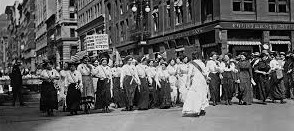Vera’s Will by Shelley Ettinger is a powerful family saga that spans continents and generations. You’ve probably read many novels that could be described that way. I’ll bet you’ve never read anything like Vera’s Will.
The book begins in Czarist Russia in 1903, where the Resnikoff family – Jewish and leftist – Is brutally attacked during a pogrom. We see the rampage mostly through the eyes of five-year-old Vitka, who understands less than we do about what the hate-crazed men – some of them neighbors and co-workers – are doing to her mother and father.
An outsider in so many ways
Ten years later, Vitka Resnikoff has become Vera Resnick, a modern American girl living in New Jersey, embarrassed by her parents’ immigrant ways. Vera is already an outsider: no longer Russian, not quite American. As if that’s not enough, she falls in love with another girl – the only two women in the world, they feel sure, to be so blessed and so cursed.
Years later, after her lover dies of influenza, Vera in her grief marries a punctilious man who moves her from working class Passaic, where everyone in her family is a leftist activist, to bourgeois Manhattan, where he speaks of nothing but his business. After years of loneliness, Vera falls for another woman. Vera’s husband, backed up by all the scientific experts of the day, declares that Vera is too sick to be allowed to raise their two sons.
Intertwined but alone
He takes the children away but Vera eventually finds them and follows them to suburban Detroit, where her sons grow into resentful adults. Vera nurses one of them through his WWII war injuries. He marries and has a daughter named, unwittingly, after Vera’s first, lost love. That daughter also grows up to be a lesbian, and the second storyline in the novel is hers.
Ettinger does a wonderful job of creating two crisp, lively narrators, each voice sharply distinct and suffused with character.The intertwined story of these two women, grandmother and granddaughter, who share so much but know so little about one another’s lives, create a moving and satisfying whole.
“Gals like you aren’t rare.”
They are engaged in their own struggles but also in the restless world around them. Through their eyes and their activism we see wars, McCarthyism, labor action, the civil rights movement, the rise of the women’s and lesbian/gay rights movements – a history of social change in America. When the granddaughter comes out to her brother in the 1970s, he musters the same tired scientific arguments that Vera’s husband once used. And yet, as Vera’s sister-in-law tells her in the 1940s, “Gals like you aren’t that rare. Did you think you were the only one who parts her hair on the other side?”
A surprising pleasure
Lately I’ve been reading some of the bright, brittle novels written by talented authors in their twenties and thirties. Most of these books I’ve enjoyed, and a few I’ve admired. But what a pleasure it is to read a book written by a novelist who brings a sense of history and her own lived wisdom to the task. Here’s an example:
This is more than grief, Vera knows. This is rage… This kind of fury. This kind of pain. When wrongs are done to you and yours. There is a righteous wrath that picks you up and sweeps you away. Sweeps you clean. And the anger is good, and the anger is true – but it takes you to a far country where no one can live all the time.
The world of Vera’s Will is a far but familiar country. I was sorry to leave it.
Get a FREE copy of Vera’s Will
I’m giving away a free copy of Vera’s Will through my newsletter in April. For a chance to win it, sign up for my newsletter.







